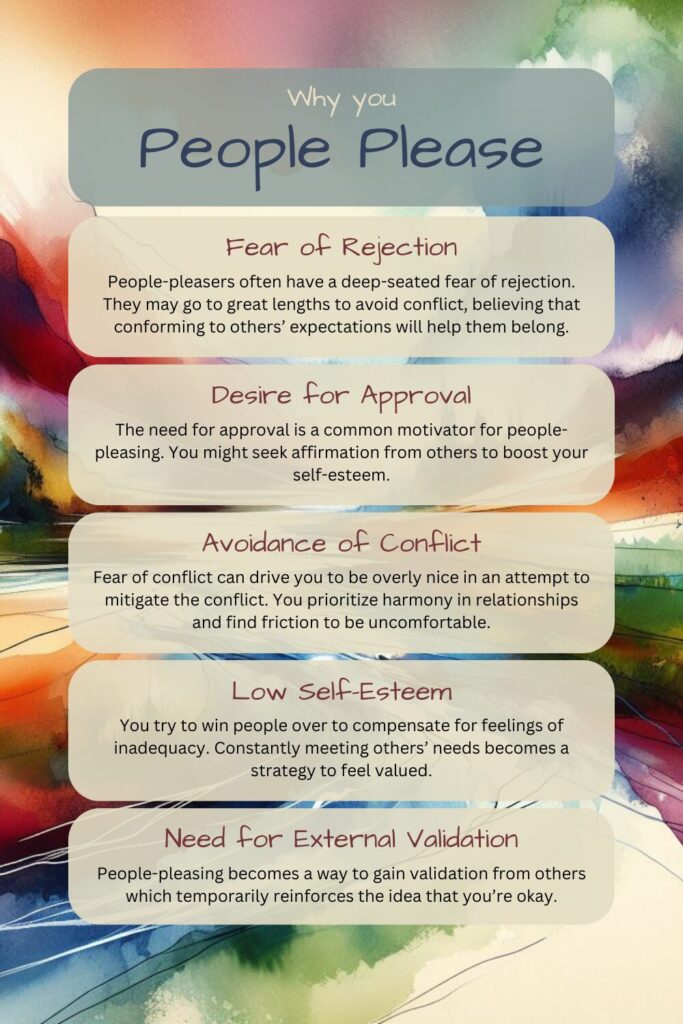We all want to be liked. After all, we’re social creatures. We grow up in families, communities, and booming social hierarchies. It’s a normal human need to want to belong, but there’s a fine line between being a part of the pack and broadcasting it to them.
When we try too hard to belong, that’s when we enter the territory of people-pleasing. And if you’re not already aware, people-pleasing has the opposite effect of what’s intended.
People pleasers come off as insecure, needy runts who have nothing better to do than to gain the approval of people who matter. It’s a disempowering position to be in and people-pleasing reeks like a foul odor.
You are better than that. I’m sure you know why people-pleasing sucks, but you still do it. You do it because you haven’t gotten to the roots of it.
Here we’re going to look at the root cause of this behavior. Why are you desperate for approval, and how can you validate yourself?
Why you're a people pleaser

People pleasing isn’t something that we deliberately do. We do it because there is a deep underlying need to be approved of by peers. Because if our hunter-gatherer minds tell us anything, it’s that together = living, alone = death.
People pleasing is a coping mechanism. Your primal fear of rejection dictates the need to be accepted by the tribe. So you try extra hard to get on their good side, so that you don’t face the risk of being exiled.
But we don’t live in tribes anymore. In the modern social circus, we still feel the fear of rejection, but there are really no consequences for being rejected. It’s just outdated programming that makes us think we need to be on the good side of the big angry ape that leads the pack.
See the common theme here? You don’t value yourself. You feel worthless, therefor you’re trying to fill that hole by appeasing others. It’s not so much about the behavior itself. It’s about valuing yourself more, and then this manifestation will low self-worth will disappear.

See the common theme here? You don’t value yourself. You feel worthless, therefor you’re trying to fill that hole by appeasing others. It’s not so much about the behavior itself. It’s about valuing yourself more, and then this manifestation will low self-worth will disappear.
Common signs of people pleasing behavior
Here are some common signs of people pleasers. Take note of the following behaviors and see if you can think of instances in your own life when you do it.
-
Overcommitting: You make much bigger commitments than you should, and usually for things that aren’t very important.
-
Difficulty saying no: You might find it uncomfortable to say no to people, so you just say yes instead.
-
Suppressing personal needs: You focus on how you can offer value to others and don’t prioritize your own needs.
- Excessive agreeability: You tend to agree with people regardless of their opinion or belief, even if you don’t actually agree with them.
- Avoidance of conflict: You prefer to avoid conflict at all costs, even if comes at the expense of swallowing your values.
- You can’t assert yourself: You struggle to stand up for yourself, your beliefs, and values, and instead discount them as inferior or ‘wrong’.
- You don’t have a preference: Anything goes, all the time. You rarely state your opinion in case people disapprove. As a result, you’re generally not as vocal as others.
- You give more than you take: You are always giving your time and energy, but you rarely get it back. People come to expect that you will go out of your way for them.
Why people pleasing isn't good for you

Let’s start with yourself.
You are the clear loser here because you’re spending much more of your energy than the people you’re trying to please.
But to add icing to the cake, people tend to respect you less because you’re a try-hard. After all, the bad boys always got the ladies because they didn’t give a crap. People respect that self-confidence and assertiveness, even when it’s slightly (or highly) misled.
It’s refreshing when people don’t care, and just be themselves. When you’re trying to win someone’s kindness or attention, you’re instantly disqualifying yourself from being respected.
So let’s look at why this habit needs to be curbed.
The hidden costs of people pleasing
Beyond stress and burnout from trying too hard, people-pleasing has deeper consequences.
Over time, people pleasing erodes your self-worth because you’re essentially degrading yourself by valuing other people’s time and energy over yours. You’re putting other people on a pedestal, and this is going to warp your self-perception.
Further more, you could be spending that time and energy on yourself to improve your own life. But since you’re wasting it on people who don’t care about you, your own growth is stunted.
When you spend your whole life being a people pleaser, it can become difficult to express yourself authentically because you’ve become so accustomed to having a persona. That means your authentic self might feel unnatural, and you create more of an aversion to it.
The root cause of people pleasing
People pleasing comes from a lack of self-worth. If you don’t value yourself, you try to artificially make up that value by being extra helpful.
Changing your behavior is one thing, but people-pleasing is always going to feel natural to you until you learn to value yourself more and heal the root cause of this detrimental self-image.
To get to the bottom of it, it’s necessary to reflect on this behavior and recognize when you’re doing it. Time to start improving your self-image. Start with the article below.
Now, let’s get into the more actionable steps to improve your image, and stop people-pleasing.
Building assertiveness without guilt

Conflicts trigger a part of you that feels like you need to survive. You don’t feel like the big dog. You feel like the runt that needs to be submissive.
But in today’s world, you have just as much power as anyone else. It’s all a perception, and you certainly don’t need to win people’s approval to survive. So what you need to do is learn how to build your assertiveness without feeling like you’re going to be exiled from the village.
Here are some things you can do.
Stop trying so hard
I used to be super nice to people I didn’t like when there was some sort of friction. If I felt like I was getting on someone’s bad side, I would suck up to them even more.
I can’t remember a single instance in my life when this worked. Yet, this seemed to happen at every single job. I always got on someone’s bad side, and I had no idea why. This was a recurring pattern that I continued to manifest until I got comfortable with not being liked by everyone.
So I developed a different approach. I still treated the person with kindness, but once it got to a point, I stopped trying altogether.
Why put in the effort when it just doesn’t work out for me? So I minimized interacting with the person as much as possible. I would still be polite when I did, but otherwise, I just didn’t put in the effort, and you know what?
It felt good!
One time at a job working in an airport restaurant, one of the guys I worked with just didn’t like me. He usually ignored me, and I would reciprocate by constantly trying to make conversation, help him out, and just try way too hard to get along with him.
So I decided to stop.
At first, it was awkward, but then it became normal. One day, the person flipped, and suddenly they were engaging me, showing interest in my life, and genuinely being kind.
I responded pleasantly, asked some questions back, and moved on. From that moment, this person had a very different attitude towards me. He treated me more like a friend because the power dynamic changed when I stopped trying.
In my experience, disengaging people apart from necessary communication signals a message. People tend to reflect once they realize they’re no longer wearing the pants. The person thinks ‘Wait, am I the asshole?’ Which often causes them to change their attitude towards you.
Remember, you don’t need to be friends with everyone. If someone doesn’t want to be your friend, that’s on them, not you. So don’t treat it like it’s your problem.
Put yourself first
It’s great to want to help others and all, but if you’re a people pleaser, that’s the least of your concerns. You need to counterbalance helping others by putting yourself first. This just comes down to self-care.
I don’t mean this in an egocentric sort of way. But likely you put everyone else’s desires before your own, and this comes at the compromise of your own needs. So you need be a little bit selfish.
To you, it might feel like you’re being an asshole. To other people, it probably comes across as reasonable. So before you do anything, think about whether it’s in your best interest to do so.
Sure, you can let little favors slide here and there, but otherwise, prioritize your own needs.
Voice your opinion more often
Opinions are like assholes. Everyone’s got one. But you’ve made yourself an exception to that rule because your opinions might not slide with some people.
You might not think that your opinion is wanted, but more than likely, your opinion is a welcome change. Even if you don’t resonate with someone’s opinion, there’s something nice about people speaking their truth, and having an opinion.
What terrifies me is living in a world where people are like robots and everyone just conforms without voicing what they think. Don’t let this be you. Be vocal about your truth, especially when it’s being attacked.
Learn to say no
If you don’t want to do something, don’t do it.
You can reject a proposal in a courteous way that doesn’t hurt anyone. When someone offers you something that you don’t want, just say ‘I’m good, but thank you’.
If someone is asking you to do something you don’t want, you can tell them your reasoning, but I find it’s easier to just tell people that I don’t want to. After all, what are they going to do about it?
So make a habit of saying no, and don’t let people pressure you. Realize when you’re being pressured to do something you’re not comfortable with and stick to your guns.
Learn your boundaries
If there’s one thing you’ve learned from this whole ordeal, it’s that you should never let people take advantage of you. You might think you’re being the better person at the time, but you always end up feeling like you sold out afterward.
So you need to form a crystal clear idea of where your boundaries are and assert them when someone tries to cross them. And I would say that people do cross them because they so easily get away with it, and know they will.
So show them that you take yourself seriously, and you’re not a free meal.
Becoming your authentic self

Not being a people pleaser doesn’t mean you can’t be nice. Honestly, it comes down to being genuine above all else, because people-pleasing is a facade to be liked. Your behavior is not integral to how you’re actually feeling, and this is an issue.
If you were being kind out of genuine love for the person, it’s a much different story. But since you’re trying to please them, you have a hidden agenda. You’re looking for something, whether it’s attention, friendship, brownie points, approval, or whatever it may be.
Therefore, being authentic with how you actually feel is a powerful antidote to people pleasing. Let’s look at how you can become more authentic here.
Be genuine
It’s good to be genuinely kind. I base my life around values of kindness and generosity, but now I’ve found a healthy balance. If it’s not genuine kindness, as I don’t care about the person, it comes off as crummy and weak.
Again, it’s good to be kind, but it should be because you genuinely want to bring a smile into people’s lives, not because you want to improve their perception of you.
If you’re not feeling it, don’t wear a mask. Own your feelings and be congruent with your mood at the time.
Build up your self-worth
There’s no way around this one. Part of why you people please is because you don’t feel worthy of love yourself. Because you don’t feel worthy, you feel you need to win it, rather than respect being something that you’re entitled to.
Building up your self-worth is a mission on its own. There’s no shortcut to perceiving yourself in a better light. It takes time and effort. To get started with this journey, click on the link below and let’s get into it.
Recognize your value
I can assure you that there is something valuable about you. There are things that you unknowingly offer that you just don’t recognize.
Maybe it’s your intelligence, your generosity, your wisdom, your good heart. Maybe you’ve got a calm energy, an unusual perspective that others can learn from, or a difficult life journey that people can be inspired from.
You are valuable in one way or another. Identify why you’re a valuable person, and what you have that a lot of people don’t. Understand that people benefit from your value, but they are not entitled to it. So own it!
People pleasing in relationships

When you’re with someone who you feel is out of your league (or you’re trying to win them over), people-pleasing is detrimental.
Aside from dating skills 101: The nice guy doesn’t get the girl, people pleasing in relationships can prematurely end it too. That’s because people want to feel like they’re with an equal. If you’re with someone who’s kissing your feet and trying to win your love, then it’s not a very strong foundation for a relationship.
But removed from attraction dynamics, people pleasing causes other problems.
Firstly, you may suppress your true thoughts and feelings to meet the perceived expectations of your partner. You will do what makes them happy at the sacrifice of your happiness.
Over time, the façade of constant agreeability can lead to a lack of genuine communication as your true desires remain unexpressed. This can also lead to things like resentment, mistrust, and all sorts of issues.
You might feel like you’re not being appreciated for all the effort you’re putting in, which can lead to breakdowns in communication. This is how more of my relationships than I would like to admit had ended, because I didn’t express myself. You can read about one of these breakdowns here.
A healthy relationship thrives on mutual understanding, respect for individual boundaries, and the freedom to express one’s true self.
To stop people-pleasing in a relationship, here’s what you need to do:
- Identify how much you people please, and for what reason
- Stop giving if you rarely take. There should be some sort of energy exchange
- Practice saying no to things in a polite way
- Establish clear boundaries with your partner
- Openly communicate with your partner. Tell your partner how you’re feeling, and why you’re feeling this way
Cultivating healthier relationships with people-pleasers
On the other hand people pleasing is wanting to help someone who is trying to impress you.
When you notice someone trying to earn your love or affection, it is important to point their attention toward this behavior gently and reassuringly.
Tell the person that you want them to make more decisions, or you want them to be more vocal about their opinions. Whenever the person says something along the lines of ‘I’m fine with anything, up to you’, remind them that they’re just handing you the responsibility, and you don’t want it.
Put the pressure back on them every time they try to handball the decision to you. This will force them to start taking the lead by acting on their desires.
This also empowers the person to become more independent, because people-pleasing in a relationship can lead to codependency, all of which you can read about below:

